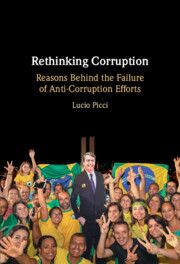Book contents
- Rethinking Corruption
- Rethinking Corruption
- Copyright page
- Dedication
- Contents
- Figures
- Preface
- Part I Laying the Groundwork
- 1 Introduction
- 2 The Consensus on Corruption
- 3 The Mutual Shaping of Measures and Concepts
- 4 Of Causality and Historical Junctures
- 5 What We Talk about When We Talk about Corruption
- Part II Three Case Studies
- Part III Rethinking Corruption
- References
- Index
2 - The Consensus on Corruption
from Part I - Laying the Groundwork
Published online by Cambridge University Press: 27 February 2024
- Rethinking Corruption
- Rethinking Corruption
- Copyright page
- Dedication
- Contents
- Figures
- Preface
- Part I Laying the Groundwork
- 1 Introduction
- 2 The Consensus on Corruption
- 3 The Mutual Shaping of Measures and Concepts
- 4 Of Causality and Historical Junctures
- 5 What We Talk about When We Talk about Corruption
- Part II Three Case Studies
- Part III Rethinking Corruption
- References
- Index
Summary
This chapter describes the main traits of the prevailing view on corruption. In particular, the current consensus view on corruption is all but monolithic, and at its “soft edges” we find themes that in fact deserve center stage, such as the elusive and contested nature of the concept. For example, although a narrow concept of corruption has predominated, it is acknowledged that the concept is elusive and its nature contested. Furthermore, it is frequently recognized that reference to corruption may have a certain degree of instrumentality, and specifically, that an anti-corruption discourse may be utilized as a means to settle scores with political adversaries. Another related theme at the edge of the current debate concerns the relationship between corruption and other social phenomena. On one hand, much effort has been dedicated to understanding the causes and effects of corruption. However, it is often recognized that the concept of corruption, being elusive, is also multifaceted and cannot be considered in isolation. The book intends to move these themes from the edges to the center of the debate.
- Type
- Chapter
- Information
- Rethinking CorruptionReasons Behind the Failure of Anti-Corruption Efforts, pp. 16 - 31Publisher: Cambridge University PressPrint publication year: 2024

